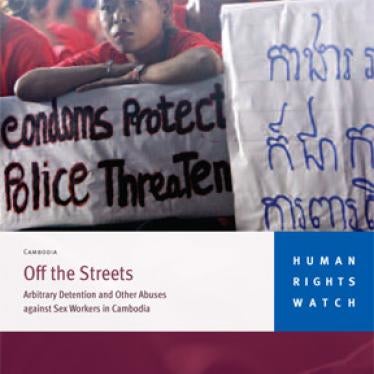After being arrested with other sex workers in a night-time police sweep, Srey Pha, 27, was detained overnight with 30 other sex workers and homeless people in a filthy holding room at the municipal social affairs office in Phnom Penh. That night, she said, three staff from the office entered the darkened room, beating and taking money from those rounded up."They made some men take off their clothes," she said. "The women were searched by those male officers... I heard from several friends that [a] man took women outside the office to have sex and then allowed them to go free."
The story is a serious warning for many sex workers and others rounded up in regular police sweeps who end up detained in this office.
Periodic crack downs on sex workers as well as the homeless, street children, and people who use drugs are ordered by municipal authorities to "clean the streets" and maintain public order. Sex workers are targeted in campaigns to crack down on prostitution and vice, as well as misguided efforts conflating trafficking with sex work. Police often use the offense of solicitation under the 2008 anti- trafficking law as a pretext to harass and arrest sex workers, though few are actually prosecuted on this charge.
The abuses do not stop at the municipal Social Affairs office. From there, sex workers are sent to the custody of NGOs, or to the government Social Affairs center at Prey Speu, located in the middle of a remote rice field, more than 19 km from Phnom Penh. In recent years center guards have carried out beatings and rape and some detainees have even died.
Human Rights Watch has called for Prey Speu to be permanently closed because our research shows that people have been unlawfully detained and seriously abused there. The government's response has been to claim that no sex workers are sent to Prey Speu, and that the center is only used to shelter homeless people who are there on a voluntary basis. This argument does not hold up.
First, there is no guarantee that sex workers will not be detained in Prey Speu. Human Rights Watch knows of at least eight sex workers detained there in May and June of this year. Upon arrest, staff at the municipal Social Affairs office told them they must either go to a NGO or to Prey Speu: "So we 'decided' to go to Prey Speu," one sex worker said. They were driven by Social Affairs staff to Prey Speu, where they were held in separate facilities from others who were there "voluntarily." Guards monitored their movements at all times, only letting them leave their room to go to the toilet or to bathe in dirty pond water. These women only managed to leave when others learned of their detention and intervened. When they left, they were forced to sign a paper saying that if they were arrested again they will be held at Prey Speu for three months. Perhaps this is what government officials mean when they continue to claim that people are only there "on a voluntary basis."
Secondly, Prey Speu remains a dumping ground for homeless people and street children. It is unacceptable that some donors and UN agencies continue to defend it as the "only alternative" that currently exists for them. Given Prey Speu's documented record of abuse including rape and torture, to promote it as a safe option, without radical changes in conditions, staffing, and oversight, does a great disservice to homeless people. It suggests that the homeless somehow lack the same rights to safety and dignity afforded to others.
Independent NGOs are not allowed to conduct regular, unannounced monitoring visits to Prey Speu. While UN rights monitors visit once a month, when monitors are not there, who stands up for detainees if staff take advantage of them or even physically abuse them? In effect Prey Speu is a closed institution, a recipe for further abuses.
Rather than pumping resources into an abusive institution, donors and UN agencies should divert funding into alternatives to Prey Speu such as affordable housing and night shelters run by qualified NGOs. Such services should be available on a consensual basis and designed together with the people who use them. Pressure should also be brought to bear on the government to thoroughly investigate past and present abuses at Prey Speu and at the municipal Social Affairs office.
Donors should also call on the Phnom Penh governor, municipal authorities, and police to stop the arbitrary sweeps against sex workers, homeless people, street children, and people who use drugs, and to end the cycle of arrest and detention. There would then be no need for a place like Prey Speu.
Elaine Pearson is acting Asia director of Human Rights Watch, which released a report in July, "Off the Streets," detailing abuses against sex workers.








